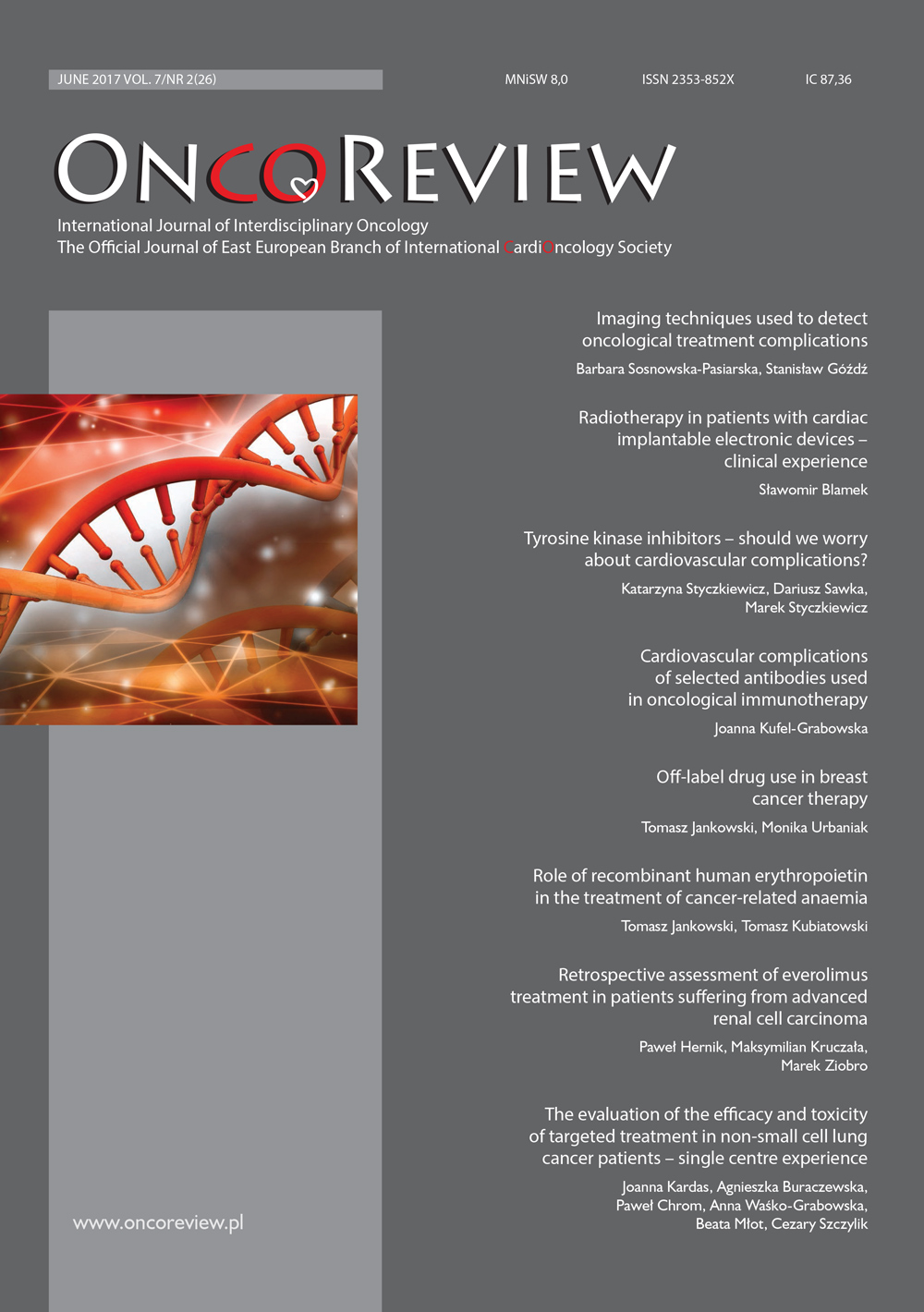Retrospektywna ocena leczenia ewerolimusem chorych na zaawansowanego raka nerkowokomórkowego Original article
##plugins.themes.bootstrap3.article.main##
Abstrakt
Cel: Prezentacja wyników leczenia II linii jasnokomórkowego raka nerki.
Materiał i metody: Przeanalizowano wyniki leczenia 32 chorych otrzymujących ewerolimus w II linii w latach 2011–2016 w Klinice Nowotworów Układowych i Uogólnionych Centrum Onkologii w Krakowie.
Wyniki: Mediana czasu wolnego od progresji wyniosła 7 miesięcy. Stabilizację choroby uzyskano u 24 pacjentów. Działania niepożądane wystąpiły u 59% chorych, a większość stanowiły objawy w stopniach G1 i G2 według CTCAE. Najczęściej występowały: niedokrwistość, zapalenie jamy ustnej, wysypka i zmęczenie.
Wnioski: Leczenie ukierunkowane molekularnie jest jedyną skuteczną i zarazem dostępną w Polsce terapią u pacjentów z zaawansowanym rakiem nerkowokomórkowym, a ewerolimus stanowi u nich wartościową opcję terapeutyczną II linii po progresji po leczeniu inhibitorami kinaz tyrozynowych, szczególnie gdy konieczne jest uniknięcie sumowania się działań niepożądanych (odmienne profile toksyczności obu grup).
Pobrania
##plugins.generic.paperbuzz.metrics##
##plugins.themes.bootstrap3.article.details##

Utwór dostępny jest na licencji Creative Commons Uznanie autorstwa – Użycie niekomercyjne 4.0 Międzynarodowe.
Copyright: © Medical Education sp. z o.o. This is an Open Access article distributed under the terms of the Attribution-NonCommercial 4.0 International (CC BY-NC 4.0). License (https://creativecommons.org/licenses/by-nc/4.0/), allowing third parties to copy and redistribute the material in any medium or format and to remix, transform, and build upon the material, provided the original work is properly cited and states its license.
Address reprint requests to: Medical Education, Marcin Kuźma (marcin.kuzma@mededu.pl)
Bibliografia
2. National Cancer Registry. Online: http://onkologia.org.pl/nowotwory-zlosliwe-nerki-c67/.
3. Eble JN, Sauter G, Epstein JI, Sesterhenn IA (ed.): World Health Organization Classification of Tumours. Pathology and Genetics of Tumours of the Urinary System and Male Genital Organs. IARC Press: Lyon 2004.
4. Hemal AK, Kumar A, Kumar R et al. Laparoscopic versus open radical nephrectomy for large renal tumors: a long-term prospective comparison. J Urol 2007; 177(3): 862-866.
5. Berger A, Brandina R, Atalla MA et al. Laparoscopic radical nephrectomy for renal cell carcinoma: oncological outcomes at 10 years or more. J Urol 2009; 182: 2172-2176.
6. Delakas D, Karyotis I, Daskalopoulos G. et al. Nephron-sparing surgery for localized renal cell carcinoma with a normal contralateral kidney: a European three-center experience. Urology 2002; 60(6): 998-1002.
7. MacLennan S, Imamura M, Lapitan MC et al. Systematic review of oncological outcomes following surgical management of localised renal cancer. Eur Urol 2012; 61: 972-993.
8. Wu Z, Li M, Liu B et al. (Coppola D. ed.). Robotic versus Open Partial Nephrectomy: A Systematic Review and Meta-Analysis. PLoS ONE 2014; 9(4): e94878. https://doi.org/10.1371/journal.pone.0094878.
9. Gitlitz BJ, Figlin RA. Cytokine-based therapy for metastatic renal cell cancer. Urol Clin North Am 2003; 30(3): 589-600.
10. Rosenberg SA, Yang JC, White DE et al. Durability of complete responses in patients with metastatic cancer treated with high-dose interleukin-2: identification of the antigens mediating response. Ann Surg 1998; 228(3): 307-319.
11. Fisher RI, Rosenberg SA, Fyfe G. Long-term survival update for high-dose recombinant interleukin-2 in patients with renal cell carcinoma. Cancer J Sci Am 2000; 6 (suppl 1): S55.
12. Coppin C, Prozsolt R, Awa A et al. Immunotherapy for advanced renal cell cancer. Cohrane Database Sys Rev 2005; 1: CD001425.
13. de Reijke TM, Bellmunt J, van Poppel H et al. EORTC-GU group expert opinion on metastatic renal cell cancer. Eur J Cancer 2009; 45(5): 765-773.
14. Heng DY, Xie W, Regan MM et al. External validation and comparison with other models of the International Metastatic Renal-Cell Carcinoma Database Consortium prognostic model: a population-based study. Lancet Oncol 2013; 14(2): 141-148.
15. Chrom P, Stec R, Semeniuk-Wojtas A et al. Fuhrman Grade and Neutrophil-To-Lymphocyte Ratio Influence on Survival in Patients With Metastatic Renal Cell Carcinoma Treated With First-Line Tyrosine Kinase Inhibitors. Clin Genitourin Cancer 2016; 14(5): 457-464.
16. Treatment of malignant kidney neoplasms(ICD-10 C 64) – drug reimbursement programme of the Ministry of Health. Online: http://www.mz.gov.pl/leki/refundacja/programy-lekowe/.
17. Motzer RJ, Escudier B, Oudard S et al. Phase 3 trial of everolimusfor metastatic renal cell carcinoma : final results and analysis of prognostic factors. Cancer 2010 15; 116(18): 4256-4265.
18. Motzer RJ, Escudier B, McDermott DF et al. Nivolumab versus Everolimus in Advanced Renal-Cell Carcinoma. N Engl J Med 2015; 373: 1803-1813.
19. Choueiri TK, Escudier B, Powles T et al. Cabozantinib versus everolimusin advanced renal cell carcinoma (METEOR): final results from a randomised, openlabel, phase 3 trial. Lancet Oncol 2016; 17: 917-927.

